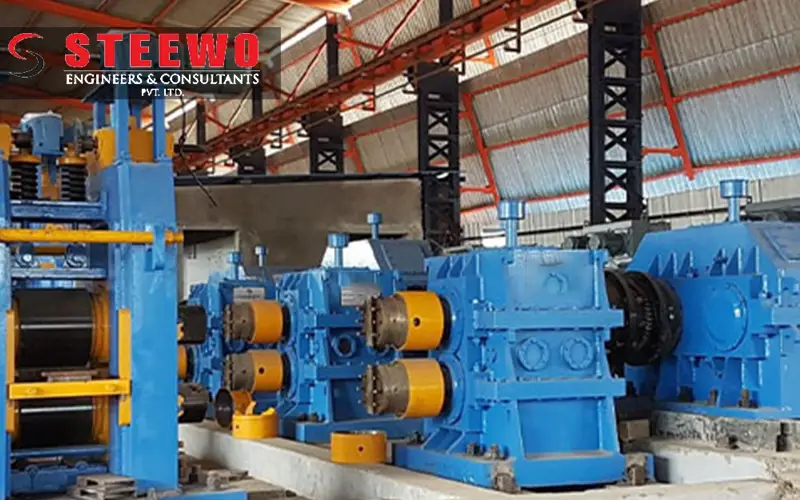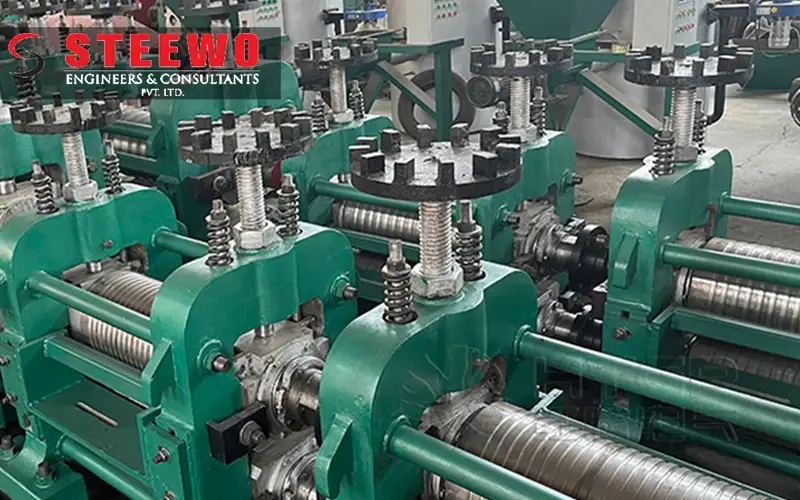Rebar Rolling MillSteewo



 Rebar rolling mills are essential to the building and infrastructure development sector as they generate rebar, or high-quality steel reinforcing bars. Steewo stands as a beacon of innovation and reliability in the realm of Steel Rebar Rolling Mill. This Rebar hot steel rolling mill is integral to the manufacturing process, ensuring the production of durable and reliable construction materials. Rebar steel rolling mills are specialist establishments made to transform ingots and billets of raw steel into completed steel reinforcement bars. The main goal is to improve steel’s mechanical qualities so that it has the strength and flexibility needed for construction projects. The construction industry greatly benefits from these mills because reinforced concrete—which is reinforced with steel bars—is an essential part of building structures.
Rebar rolling mills are essential to the building and infrastructure development sector as they generate rebar, or high-quality steel reinforcing bars. Steewo stands as a beacon of innovation and reliability in the realm of Steel Rebar Rolling Mill. This Rebar hot steel rolling mill is integral to the manufacturing process, ensuring the production of durable and reliable construction materials. Rebar steel rolling mills are specialist establishments made to transform ingots and billets of raw steel into completed steel reinforcement bars. The main goal is to improve steel’s mechanical qualities so that it has the strength and flexibility needed for construction projects. The construction industry greatly benefits from these mills because reinforced concrete—which is reinforced with steel bars—is an essential part of building structures.
As a prominent Rebar steel rolling manufacturer and supplier in India, we are proud to demonstrate our proficiency in the production and distribution of reinforced steel bars and to be a dependable supplier of excellent rebar steel products. For full TMT bar rolling mills, Steewo Engineers offers turnkey design, engineering, manufacturing, and commissioning solutions with cutting-edge technologies. Being a trusted manufacturers, suppliers and exporters of Rebar steel rolling mill in India, UK, US, UAE, Canada, Afghanistan, Australia, China, Iran, Iraq, Kuwait, Oman, Qatar, Russia, Saudi Arabia, Turkey, Uzbekistan, Yemen and Europe etc., we are dedicated to offering superior quality products that contribute to the robustness and longevity of construction projects across the nation.
TMT Steel Rebar Rolling Mill Process
 The Rebar rolling mill production line is for producing TMT Rebar. The steel billet is heated and rolled repeatedly by a conveying roller before being passed through a series of stands to achieve the appropriate size and shape in the roughing unit, where it is used to make bar rods. The hot-rolled final steel is then cooled and straightened, chopped, stacked, packaged, weighed, and stored before going through the quenching procedure to strengthen the rebar. As the best steel Rebar rolling mill manufacturers in India and more than 20+ countries, our commitment to delivering high-quality products is demonstrated by our focus on meeting and exceeding international standards.
The Rebar rolling mill production line is for producing TMT Rebar. The steel billet is heated and rolled repeatedly by a conveying roller before being passed through a series of stands to achieve the appropriate size and shape in the roughing unit, where it is used to make bar rods. The hot-rolled final steel is then cooled and straightened, chopped, stacked, packaged, weighed, and stored before going through the quenching procedure to strengthen the rebar. As the best steel Rebar rolling mill manufacturers in India and more than 20+ countries, our commitment to delivering high-quality products is demonstrated by our focus on meeting and exceeding international standards.
The Austenitic stage plastic deformation of steel is combined with quenching and additional tempering to create TMT Rebar. The process guarantees consistent qualities in every rebar, which are monitored at every crucial step to provide the TMT rebar with a strong, tough-tempered coating that gives it excellent strength and ductility, and a soft ferrite and pearlite fine-grained core. Choose us as your preferred Rebar rolling mill manufacturer, and experience the reliability and excellence that define our brand.
Major Parameters of a Rolling Mill
- Reheating: The first stage in the rolling mill process is that of reheating the input material usually billet to the rolling temperatures. Three crucial variables in the reheating process are heating rate, reheating temperature, and heating duration.
- Rolling: The process of creating a Rebar from heated billets follows reheating, and the three primary variables that determine rolling in the roughing, intermediate, and finishing groups of stands in the rolling mill are temperature, percentage of area reduction, and inter-pass time.
- Cooling: The final step involves quenching and cooling the rebar. Three key parameters must be considered after rolling is complete: the start temperature, the cooling rate, and the final temperature.
Salient Features of the Mills Provided by Steewo
- TMT mills that run economically and with extreme efficiency.
- Inputs Billets 100x 100 Mm to 150 X 150 Mm size length 3/6/9/12 meters long.
- Rolling on a cooling bed at a maximum speed of 35 meters per second.
- Automation: Complete mill on automation mechanically & electronically.
- A system for automatically managing materials that include receiving bills, rolling, counting items, packing, bending, and sending off.
- Long bearing life is ensured by housing-less compact mill stands, and tight quality control of the rolled products is ensured by high mill modulus.
- Low consumption of energy & consumables.
- Thermomechanically treated bars that meet international standards with high efficiency.
- Strict respect to national and international standards for rolling product quality.
- The TMT Bars can take shocks due to earthquakes and other forced vibrations.
Key Components and Processes
- Raw Material Preparation: The raw materials, often steel billets or ingots, are prepared first in the process. These materials are heated to high temperatures in a furnace, making them malleable for the subsequent rolling process.
- Rolling Mill Stands: Rolling mill stands are placed in sequence to form rebar rolling mills. Every stand helps the steel billet to gradually reduce and shape. The stands are equipped with rolls that progressively shape the steel into the desired Rebar dimensions.
- Rolling Process: The heated steel billet is passed through a series of rolls during the rolling process, which gradually reduces its size and shapes it into the desired profile. The ultimate dimensions of the rebar are determined by the number of passes through the rolling mill stands. This process imparts durability and strength to the steel.
The steel Rebar rolling mill process flow is as follows:
Steel billet acceptance– heating– rolling– double-length shearing– cooling– shearing– inspection– packaging– measurement– storage.
- Cooling and Cutting: The rebar is quickly chilled to lock in the mechanical qualities obtained during the rolling process once it reaches the required dimensions. After cooling, the rebar is cut into specified lengths and prepared for use in construction projects or additional processing.
Parameters:
- Annual Capacity: 300,000 tons.
- Raw Material: Scrap—- 150*150 Billets.
- Size of re-bar: 8-40 mm.
- Length of re-bar: 6-12 mm.
- Steel- Types of rolling: Structural steel, low carbon alloy steel, plain carbon steel.

Contact us



